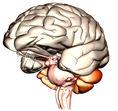题目内容

Your brain controls everything you do. It makes it possible for you to think, learn, create and feel; to blink(眨眼) and breathe and for your heart to heat –this fantastic control center is your brain. It is so amazing that a famous scientist once called it “the most complex(复杂) thing we have yet discovered in our universe”.
Can this small grey organ(器官), which weighs less than one and a half kilos, really do so much? Amazingly, your brain contains about 100 billion neurons(神经元) -it would take you over 3 ,000 years to count them all. Believe it or not, the activity in your brain never stops. Your neurons create and send more messages than all the phones in the world. And although one neuron creates only a little electricity, all your neurons together can produce enough electricity to power a light bulb (灯泡).
So exactly how fast does your brain work? Well, imagine this: a bee lands on your foot. Neurons in your skin send this information to your brain at a speed of more than 240 kilometers per hour. Your brain then uses other neurons to send the message back to your foot to shake the bee off quickly. These neurons can send this information at more than 320 kilometers per hour. No computer has your brain's unbelievable ability to deal with the amount of information coming from your eyes, ears and other sensory organs.
But how does your brain allow you to learn things that you will use in the future? The structure (结构) of your brain changes every time you have a new thought, remember or learn something. For example, riding a bike seems impossible at first, but soon you are able to do it. How? As you practice, your brain sends "bike riding" messages again and again Soon, the actions are learnt and you are able to ride a bike easily from then on.
1.From the passage we know that neurons___________.
A. receive messages very slowly B. are only found in your skin
C. send messages to your brain D. need electricity to work
2.In Paragraph 3, the writer mentions computers to ___________ .
A. compare them with the human brain
B. show how fast they have become
C. say that computers have no abilities
D. ask people to use computers more
3.When you have a new thought, ___________ .
A. your brain will power a light bulb B. your heart beats faster
C. you remember something D. the structure of your brain changes
4.Which of the statements about the brain is TRUE?
A. The speed of the neurons in the brain can be up to 320 kilometers per minute.
B. The electricity produced by the neurons can hardly power a light bulb.
C. We learn a new skill by sending the messages again and again through the brain.
D. After receiving the information, the brain send the same neurons back to your foot.
5.The article is mainly about ___________.
A. all the steps when your brain learns things
B. what an unbelievable organ the human brain is
C. how the brain makes people smarter than computers
D. the things you can do to make your brain work faster

